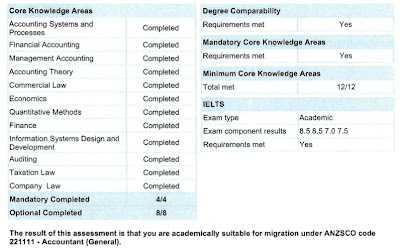An IELTS and
a favorable skills assessment are the main requirement before you are able to lodge
what they call an Expression of Interest (EOI) for a skilled migrant visa.
I feel it is
right to give a brief background on this matter first before we proceed; prior
to 1st July 2012, a different process was in place for those who were
interested in getting visa to live in Australia - it goes something like, get
all your requirements in place, pay the visa fee and wait for the results. They
changed the process as of 1st July this year and introduced the EOI.
The main difference here lies on the fact that you need to be invited first
before you can be able to actually apply for the migrant visa.
Let me
explain how the EOI system works. Once you have your IELTS and your skills
assessment, you can log on to the DIAC website to create your profile and begin
in the lodgment process. There will be a series of questions that will be asked
in the website, your answers to these questions will enable you to gather
points (take note: the minimum points requirement by DIAC in order to be
invited is 60) which will determine later on whether you will be able to get an
invitation or not. The below summarizes the selected data in our EOI and the
corresponding points that we claimed.
- Age: 30 points
- English Language Ability: 10 points
- Skilled Employment: 15 points
- Education qualifications: 15 points
From the above,
we can see that we claimed 70 points total in our EOI (I will leave it to you to
read on this LINK for further explanation on how it goes in order to claim
points - please refer to the document under the points tab). Once we submitted our EOI, this was placed in a pool together with the
rest of the other EOIs. These are ranked accordingly as per points claimed and
the date of submission. As mentioned in a previous posts, getting as much
points as possible will greatly enhance your possibility of getting selected.
Prior to clicking the submit button, we did a thorough checking of the data that we have placed in the EOI. As the system does not have any way of verifying the points you have claimed, you can technically claim more than what you really have. It should be noted that erroneous claiming of extra points could be a strong ground for refusal of visa.
Prior to clicking the submit button, we did a thorough checking of the data that we have placed in the EOI. As the system does not have any way of verifying the points you have claimed, you can technically claim more than what you really have. It should be noted that erroneous claiming of extra points could be a strong ground for refusal of visa.
DIAC has a
selection process scheduled twice a month; a certain number of invitations are
given and the highest ranked EOI will receive those invitations. During the month that we applied, there
were a total of 950 invitations given out every 2 weeks for skilled migrant
visa.
As our total points claimed was more than sufficient, we were fortunate enough to be invited to apply for skilled migrant visa a week after we submitted our EOI. Happy times! :)
As our total points claimed was more than sufficient, we were fortunate enough to be invited to apply for skilled migrant visa a week after we submitted our EOI. Happy times! :)





